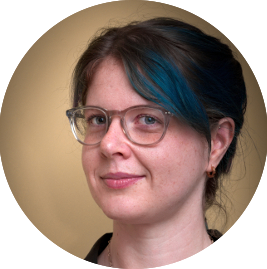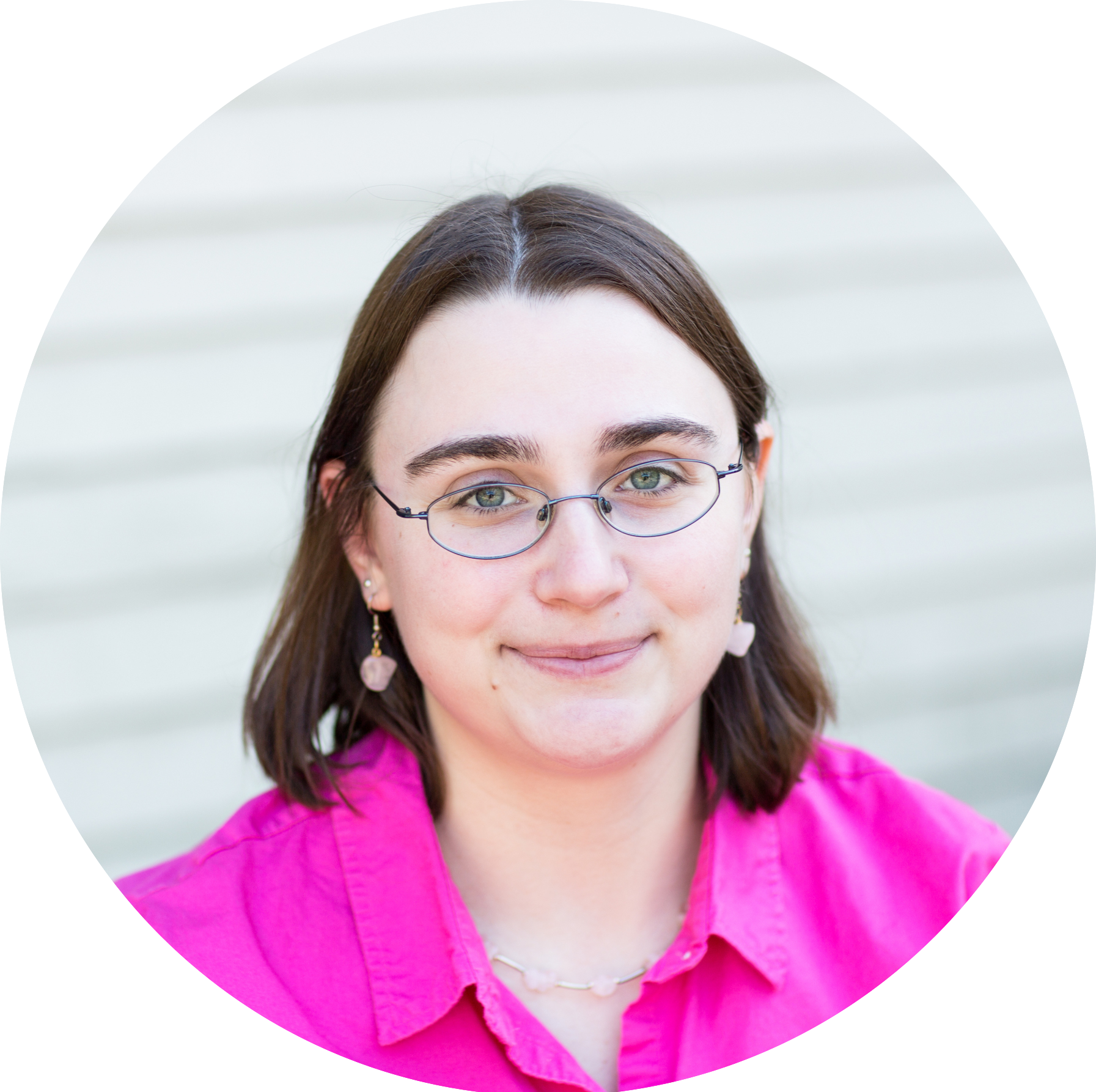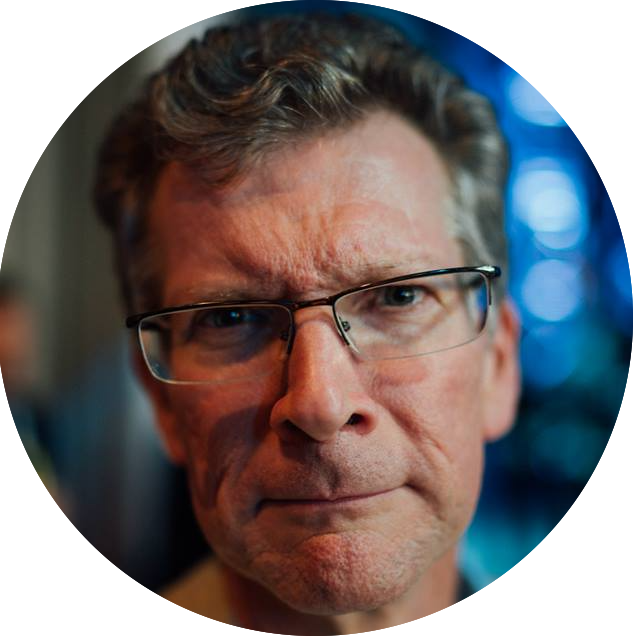News
Many months ago I had a request to share our CFP accept/decline/waitlist emails. Since a lot of conferences have to send these out, I figured I’d share them publicly here rather than share them with a single person.
As with all SeaGL materials, these are licensed CC BY-SA, so feel free to use and remix them however you and your event needs.
SeaGL Talk Proposal Acceptance Email
SUBJECT: [seagl20XX] Proposal accepted!
BODY:
Dear {name},
Your proposal, {eventtitle}, is accepted for {conference}!
We would like to announce the schedule soon, so please confirm your talk no later than EOD Pacific Time on DATE. You can confirm your talk at {proposalslink} or by responding to this email.
Your submission can be found at: {proposalslink}
We encourage you to share the news of your talk acceptance far and wide! If you tweet about it, please tag @seagl so we can retweet it for you.
We are hoping to record this year’s talks. Please let us know if you would NOT like your talk recorded.
We’re looking forward to seeing you in MONTH!
Best wishes,
{conference} Team
{conference_splash_link}
SeaGL Talk Proposal Decline Email
SUBJECT: [seagl20XX] Proposal declined
BODY:
Dear {name},
Your proposal, {eventtitle}, was unfortunately not accepted for SeaGL this year.
We know you put a lot of time and effort into your proposal and we want to thank you for making our selection process so challenging.
If you would like feedback on your proposal, please email proposal-feedback@seagl.org and we will share what we can, as soon as we get a chance. (If everyone asks for feedback, it might take a little while.)
There are many potential reasons why we declined your proposal that have nothing to do with the quality of the topic itself. For instance, it may not have been a good fit for the SeaGL audience, or it was declined because we’re only accepting one talk per speaker.
It’s still a good idea that deserves more exposure. If you would like to share your story, we encourage you to submit your proposal to our friends at opensource.com as an article idea: https://opensource.com/how-submit-article
We hope you will plan to attend SeaGL in MONTH. There will be lots of great people like you there to meet and share ideas with.
Thanks again for taking the time to submit a talk proposal. We really appreciate it!
Best wishes,
{conference} Team
{conference_splash_link}
SeaGL Talk Proposal Waitlist Email
SUBJECT: [seagl20XX] Proposal Waitlisted
BODY:
Dear NAME,
Your proposal(s) was highly rated by our reviewers but faced a lot of excellent competition. We would like to include it in the program but ran out of space for it:
We’ve sent out the first round of acceptance emails and anticipate some speakers will not be able to make it, leaving open holes in the schedule where we can fit your talk. This may take a little while as the schedule settles out.
If you would like to remove your proposal from the waitlist rather than wait for a schedule opening, we totally understand. Just reply to this email and we’ll handle that for you.
We hope you will still plan to attend SeaGL in MONTH. There will be lots of great people like you there to meet and share ideas with.
Thanks again for taking the time to submit a talk proposal – we really appreciate it!
Best wishes,
Seattle GNU/Linux Conference 20XX Team
https://osem.seagl.org/conferences/seagl20XX
All talk proposal notifications went out this morning. While we’re still waiting for speakers to confirm they can do the selected talks, we thought it would be interesting to share some more numbers now that the schedule is taking shape.
Method
Our selections are based almost entirely upon raw score data. To put it simply: the highest-rated talks were accepted, with the caveat that we only accepted one talk from any proposer.
Normally we’d look at the raw scores and then massage things a bit to get a better balance of topics and speakers, but that was not necessary. The proposals we received this year were so good and so diverse that no program-massaging was necessary at all. The straight numbers were pretty much all we needed.
And speaking of numbers…
55 talks accepted
We received 163 proposals and accepted 55 of them. That’s a 33.7% acceptance rate.
The majority of declined talks were due to us accepting only one talk per speaker. A lot of folks proposed several talks, so they received several decline emails.
We’re very grateful that people proposed multiple talks. It allowed us a lot of flexibility in creating a well-balanced and interesting program. Next year, though, we’d like to consolidate to a single decline email if possible. It’s more humane than, for instance, one acceptance email and six decline emails (as one of our proposers received).
Break down by track
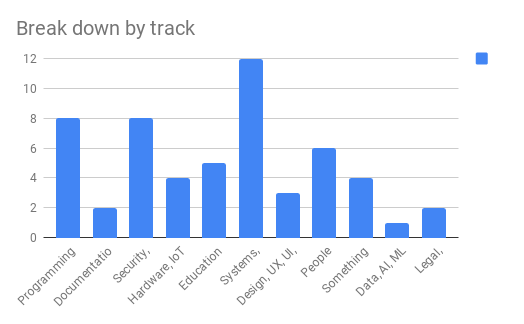
Sysadmin/Ops/DevOps was far and away the most popular track among the accepted talks, but Programming and InfoSec weren’t too far behind.
Bringing up the rear is Data/AI/ML with only a single accepted talk. Considering the current popularity of AI and Machine Learning, we were really surprised we didn’t receive more good proposals on this topic.
Regardless, the SeaGL schedule is going to have something for everyone. We’re very pleased with the diversity of topics represented.
27% 20-minute talks
Last year we introduced the 20-minute talk option and we had 14 talks of that length on the schedule.
This year we have 15 20-minute talks on the schedule (so far), which is nice and consistent.
13% first-time presenters
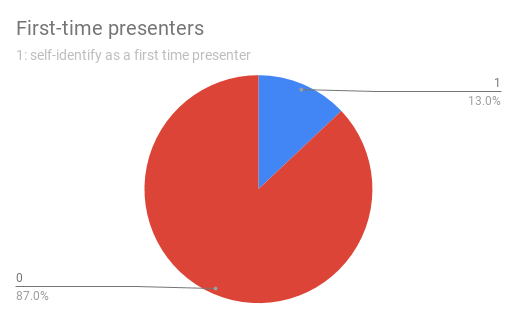
SeaGL believes in building the Free Software and open source community of the future and part of that is supporting new conference speakers.
We’re pleased that 13% of our acceptances this year were from people who have not presented at a conference before.
We would like to improve this number in future years, but when 6.4% of the total number of proposals were from people who self-identify as first time speakers, we think that 13% is still pretty darn good.
Welcome to presenting! We’re happy to have you at SeaGL.
44% under-represented presenters
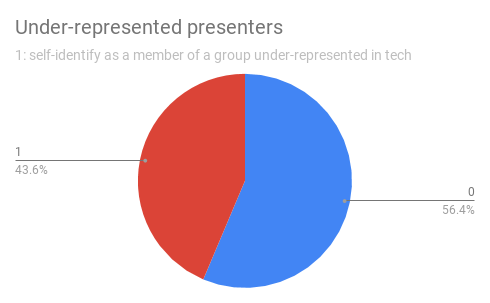
A full 44% of the accepted talks come from people who self-identify as a member of an under-represented group in technology.
We’re particularly proud of this number, we have to confess. We work very hard to make SeaGL a safe space for all people. With numbers like this, it looks like the word is getting out. We’re very honored that people trust us to continue having a welcoming environment.
It’s only through embracing, increasing, and fostering diversity in technology that we’ll be able to improve and spread the ethos of Free Software. Thank you, SeaGL attendees and staff, for helping with this and keep up the great work.
Schedule caveat
These numbers are just for the initial acceptances. Due to speaker schedules and obligations, some of them may not be able to present at SeaGL in November. Therefore the final schedule may not reflect these exact numbers as we sub in someone from the waitlist.
Nominations are open for the 2018 Cascadia Community Builder Award
The Cascadia Community Builder Award is designed to recognize work in software projects, non-profit organizations, outreach and education, hackerspace, user groups or any activity that promotes the adoption and appreciation of free software to new and larger groups of people. The awards committee is especially interested in individuals who have successfully reached out to traditionally under-represented groups, even if that isn’t their primary goal.
To nominate someone, please send us an email email us at award@seagl.org with the nominee’s name in the subject line.
- Name and email address of the nominee (if you have it)
- A sentence or two about why you think they deserve this award
- Projects or organizations they serve through (links are very helpful!)
Please only nominate people who are doing their free software work in the Cascadia region and who are currently living. Thanks in advance for helping us honor a great community builder!
The award will be presented in November at SeaGL. Want to be part of the action? We’re actively seeking volunteers! Just email participate@seagl.org and introduce yourself!
We like to be free and open around here at SeaGL, and that includes transparency around a lot of our processes. This post is the instructions we provided to our review committee on how they should rate the 160+ talk proposals we received. We hope that these instructions will not only help people craft better proposals in the future, but also help other events who may be looking for guidance on how to review their own proposals.
Audience profile
The audience runs the gamut from experienced FOSS technologists to the uninitiated/students, leaning quite heavily to the latter rather than the former.
Therefore talks about how to scale your unicorn are less applicable than more introductory topics.
Which isn’t to say there’s no space for unicorn scaling type talks, just that they will be in the minority for the program.
This is also a much less corporate conference/audience than, say, SCALE/OSCON/ATO/etc. Our event is free to attend, so it attracts those who are interested in or passionate about technology more than those who are getting their company to pay for them to attend for training purposes. This also means that most of the audience will be very local to the Seattle region.
Criteria
- Please remember the Code of Practice
- Our CFP system can’t do blind reviews, but try to do as blind as possible (the abstract/content is more important than the presenter, on first pass at least)
- Only vote on talks which you feel qualified to judge
- Leave stars blank else
- Exception: something which sounds so cool or so crappy that you feel compelled to vote
- Don’t vote on withdrawn or rejected talks
- OSEM keeps these in the list, sorry
- Sorting list by ‘State=new’ can help limit these review misfires
- Keep the audience needs front and centre
- “Yeah, I would like to see this” is NOT important
- “Yeah, the audience would get value out of this.” is VERY important
- Therefore, if an abstract has no clear audience takeaways, please vote it down
- No advertisements or sales pitches allowed
- Please vote down anything that looks like it’ll be a pitch
- GNU/Linux/Free Software not required
- Yes, it’s the Seattle GNU/Linux conference
- No, we’re not bigots against non-Free (as in speech) technologies
- That said, proposals predominantly about proprietary technologies should be voted down
- Proposals including questionable language/messaging should be voted down
- Language/platform/community shaming
- Colloquialisms based in or statements implying or outright stating racism, sexism, anti-LGBTQ-ism
- Mean-spirited or rude language
- Etc.
- Non-software tech is welcome
- For instance, in 2016 we had a very well received talk about WW1 technologies
- And, naturally, please don’t vote on your own talks
Process
- The workflow
- View the Events on the conference site
- OSEM calls proposals “Events”
- View each event
- You’ll probably either have to open each in a new tab/window or do a lot of click-vote-go_back action
- Apologies for the cumbersome UI/UX here
- Vote & optionally comment
- Repeat until done
- Meaning we’ll use for the stars:
- none: Did not vote
- ⭐️: No way, nuh uh, hell no, nope
- ⭐️⭐️: Meh, maybe, could work
- ⭐️⭐️⭐️: Yup, I’d like our audience to see this
- Whether you vote on a proposal or not, feel free to add a comment
- Proposers can NOT see these comments (but be nice anyway)
- Admins CAN see these comments
- Reviewers can see these comments if they click through
The 2018 SeaGL Call For Proposals (aka CFP) has closed and our team of reviewers is hard at work reading all of the excellent proposals we received. How did the CFP go this year? Here are some numbers for you…
166
The number of proposals we received. This broke our 2017 record of 153 proposals!
24%
The percentage of proposals that are for the shorter 20 minute time slot. In 2017, 23% of the proposals were for this length of talk, so this holds steady in popularity.
10
The number of proposals that are from who self-identify as first-time speakers. This is the first year we’ve tracked this statistic, and we’re hoping to increase this number in future years. One of SeaGL’s missions is to help more people get involved with Free Software and open source, so helping new people share their FOSS stories is very important to us.
32
The number of talks in the track with the most proposals, Systems, sysadmin, ops, DevOps. The breakdown of all of the proposals by track/topic:
- Systems, sysadmin, ops, DevOps: 32
- People: 30
- Programming: 29
- Something different: 21
- Security, Information Security: 19
- Education: 9
- Hardware, IoT: 8
- Data, AI, ML: 6
- Design, UX, UI, Accessibility: 5
- Documentation: 4
- Legal, Licensing: 2
The final schedule of the conference is very unlikely to reflect these numbers. Our aim is to provide value to the SeaGL audience. As the audience is diverse, so much be the schedule. We’ll aim to balance things as much as possible so there’s something good in there for everyone.
And speaking of diversity…
35%
The percentage of proposals that were submitted by people who self-identify as a member of a group under-represented in technology.
This is the first year we’ve tracked this statistic as well, and as with the first-time speaker stat, we also hope to increase this percentage in future years. We want our speaker line-up to look like the people who love Free Software and open source (read: every colour, gender, ability), but that’s only possible if our proposals come from a rich diversity of individuals. Maybe in 2019 we can reach 40%? Or even higher? That would be excellent.
What’s next?
Like I mentioned earlier, our reviewers are diving into their task right now. They should be done reviewing near the end of the month, then we’ll have a call to discuss the proposals. After that, it’s up to the program committee chair (me) to build the schedule.
We promised to let all proposers know the status of their proposals no later than September 3rd. So far we’re on track to do that. We won’t have information sooner than that, in any case, so please hang tight.
In the meantime, we plan to share the proposal review criteria and instructions that we gave our reviewers. Stay tuned for that blog post in the next week.
Calling all speakers or speakers-to-be! Our 2018 Call for Proposals is open!
We are currently doing weekly proposal review/feedback sessions as well as email proposal review and feedback. Please bring us your talk ideas and proposals and we’ll help you polish them before you submit them to the CFP. See the Help and mentoring for your proposals section for more information.
SeaGL is dedicated to supporting newer speakers. We welcome speakers of all backgrounds and levels of experience – even if you’ve never spoken at a technical conference. If you’re excited about Free/Libre/Open technologies or communities, then we want to hear from you!
Because we’re a community-focused event based in Seattle, we’re particularly interested in hearing from new and experienced speakers from the Seattle and Pacific Northwest region, but we welcome proposals from anyone no matter where you’re based.
Here’s what we cover in this CFP announcement. We know it’s rather a lot, so you can click to jump to the section you need (but we encourage you to read it all through at least once).
CFP dates
- CFP Opens: June 4th, 2018
- CFP Closes: July 29th, 2018 - Midnight PDT
- Speaker Notifications: September 3rd, 2018
- Schedule Published: September 17th, 2018
- SeaGL!: November 9-10, 2018
Audience profile
SeaGL is honored to be hosted by Seattle Central College. Because our event occurs partly during their school week, we have not one but two audiences. Both audiences are present both days of the event, but each day has a larger proportion of one type of audience member:
- Friday: School is in session on this day, so many of our attendees are community college students. We try to schedule more “Free/open source 101” type talks on this day to help the students get a firm grounding in FOSS and its technologies.
- Saturday: Weekend! We have fewer students on this day and more professionals and hobbyists. This audience is more familiar with technology in general and often is looking for more advanced talks or introductory talks on more advanced topics.
Like last year, in 2018 SeaGL is looking for talks in two formats:
- 20 minutes: Introduce the audience to a new technology, concept, or just recap an older idea which you think is really neat.
- 50 minutes: Go more in depth! Do a demo! This is your chance to really educate the audience about something you enjoy.
Both of these time slots include the Q&A time. Please time your presentations accordingly. We suggest aiming for a 15 minute presentation for the 20 minute time slot and for 40-45 minutes for the 50 minute time slot, but as the speaker the final presentation time is up to you (as long as you don’t exceed your time slot).
We do not have workshop (60+ minute) slots available at SeaGL and will not be opening any. Please do not propose talks that cannot be presented well within the two time slot options above.
Click here to propose a talk.
Talk categories (aka Tracks)
SeaGL doesn’t do “tracks” like many other conferences do, but we do use tracks to make sure we have a nice balance of subjects covered during the event. Think of them more like categories than tracks in the traditional tech conference sense. This year you can select from one of the following categories when creating your proposal:
- Data/AI/ML
- Design/UI/UX/Accessibility
- Documentation
- Education
- Hardware/IoT
- Legal/Licensing
- People
- Programming
- Security/InfoSec
- Something different
- Systems/Ops
Don’t worry if your talk isn’t a snug fit with any of these categories. It’s not a problem and we don’t mind at all. Just pick the one that’s the closest fit, and if nothing else please do use the Something different category.
Click here to propose a talk.
Topic ideas
Not sure what to propose? Here are some ideas!
- How to get involved in free and open source software
- DevOps, system administration, infrastructure, CI/CD
- Career tips and strategies
- Web development tools and techniques
- Policy and licensing affecting free and open source software use or development
- Hardware, embedded Linux, or the Internet of Things
- The cloud and other distributed services
- Building free and open source communities
- Using free software at home, work, or school
- Security and privacy online
- Writing testable code, and testing in general
- Effective documentation patterns and strategies
- Free and open software on non-GNU/Linux platforms (Windows, macOS)
- Anything else that you think would be interesting to new or seasoned Free/Libre/Open source fans!
Click here to propose a talk.
PLEASE don’t do this…
Our conference software doesn’t currently support concealed reviews (where the reviewers can’t see who proposed a talk), but we do the best we can to review everything concealed anyway.
Because of that, DO NOT INCLUDE YOUR NAME IN YOUR ABSTRACT.
Your name is for your bio, not for your abstract. If you include your name in your abstract, you are at risk of having your proposal voted down and not accepted.
We really can’t stress this enough. Don’t do this. Really.
Proposal and public speaking resources
Never presented at a conference or meetup before? Presented but still not feeling confident? It’s OK, even the most experienced conference presenters aren’t necessarily confident at this stuff.
The Public_Speaking repository has collected a lot of resources to help you level up in your conference presenting.
Pay particular attention to the Proposing talks section of this page. Follow these tips and your talk proposals will stand a better chance of being selected.
PLEASE NOTE: Whether your talk is accepted or not often doesn’t have as much to do with how great your proposal is as it does with how many speaking slots the conference has available and the balance of the program the organisers need to craft. It’s nothing personal: we just don’t have enough time to accept all the great talk proposals we receive.
Don’t let that stop you from proposing! You can’t win a race you don’t even run, so click here to propose a talk.
Help and mentoring for your proposals
Want to propose a talk but want feedback on your idea, proposal wording, talk title or just on how to deal with nerves? The speaker committee is running CFP office hours during the CFP. We’ll do everything possible to help you be successful with your proposal and presentation. Office hour times:
All office hours are held in the #seagl IRC channel on Freenode IRC. Don’t worry if you’re not familiar with IRC. Just click here for the webchat, choose a nickname, and you’re good to go!
If you’d like assistance outside of the office hours, please email us at cfp-help@seagl.org. We welcome all questions that arrive between June 4th and July 29th.
Speaker travel support
As SeaGL is a free to attend community-oriented and -organized conference, we regret that we are unable to help with the cost of travel and accommodation for speakers at this time.
Code of Conduct
All speakers and attendees of SeaGL must agree and adhere to the Code of Conduct for the safety and enjoyment of all organizers, volunteers, speakers, and attendees. We ask that all prospective speakers review and confirm their willingness to abide by the Code of Conduct terms and expectations when interacting within SeaGL community spaces.
Code of Practice
All members of the SeaGL Program Committee have agreed to operate according to our Code of Practice.
No, really, click here to propose a talk. Please. We want to hear from you!
Did you miss the announcements of our four keynote speakers for 2018? We’re very excited and honored that these folks accepted our invitation! Click on each one below to learn more about them:
We at SeaGL believe in sharing and openness. In that spirit, we’ve posted our keynote selection process. Learn all about how our community helped choose our keynote speakers this year.
Interested in being a part of SeaGL 2018? Our CFP opens a week from today on June 4th. If you’d like to volunteer, please drop us a line at participate@seagl.org. We can’t wait to see you in November!
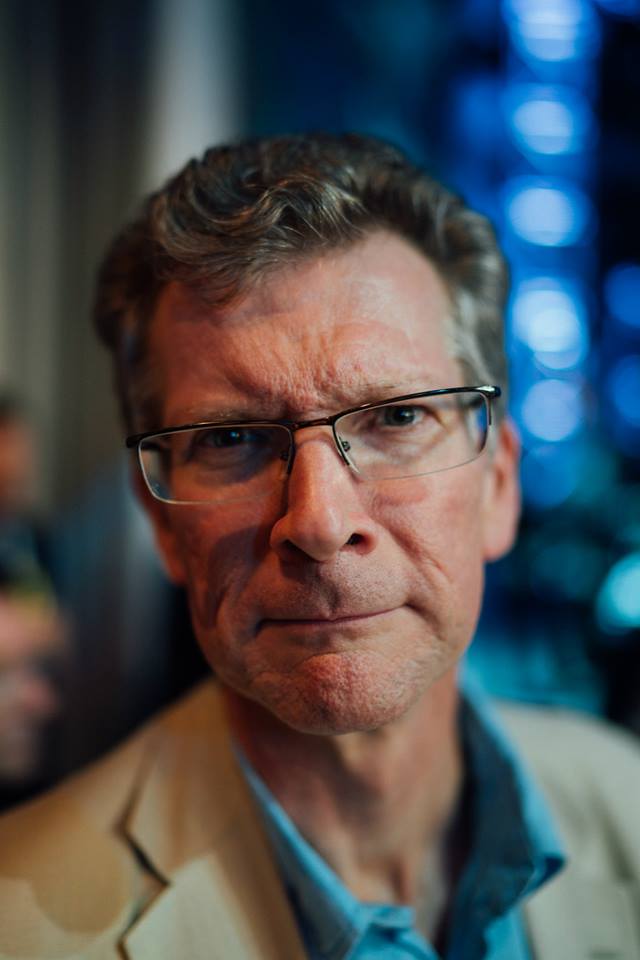
Our final keynote announcement for 2018 is Stephen Walli!
Stephen is a principal program manager working in the Azure engineering team at Microsoft. Prior to that, he was a Distinguished Technologist at Hewlett Packard Enterprise. Stephen has been a technical executive, a founder, a writer, a systems developer, a software construction geek, and a standards diplomat. He has worked in the IT industry since 1980 as both customer and vendor, working with open source for 25 years. He blogs about open source and software business at Once More unto the Breach, opensource.com, and on Medium.
That’s four out of four 2018 keynoters now revealed. We’re thrilled to host these brilliant people and honoured that they agreed to present. Please join us on November 9-10 and hear for yourself what they have to say!
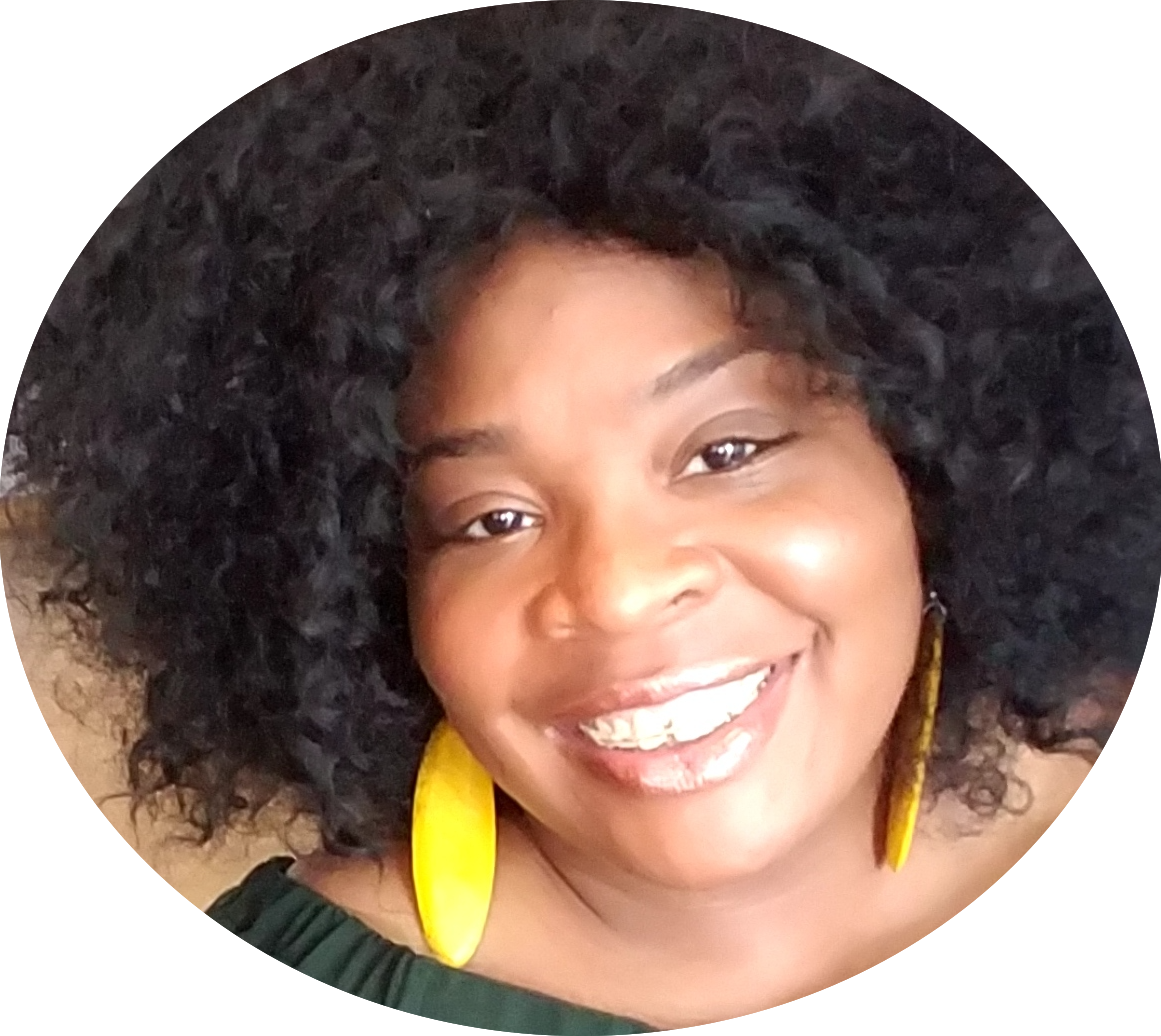
And now, for the third of four 2018 keynote announcements, we present Tameika Reed!
Tameika founded Women In Linux out of frustration that there were no other women or women of color represented at the workplace or tech events. Tameika is a self-taught Linux Administrator since 2000. She has provided countless of hours to helping others get started in Linux. She has spoken at conferences such as OSCON on Diversity in Education, Women In Linux Conference on various topics, and LISA on a Plenary Panel: “Scaling Talent: Attracting and Retaining a Diverse Workforce”. Since the the creation of Women In Linux, Tameika has inspired countless of women, men, and children to succeed in tech as well as in their perspective fields. She continues to explore outside the norm of just Linux by introducing Hyperledger, Kubernetes, Microservices, and High Performance Computing.
Our keynotes are nearly all revealed. One announcement remains. Come back tomorrow to learn who it is!
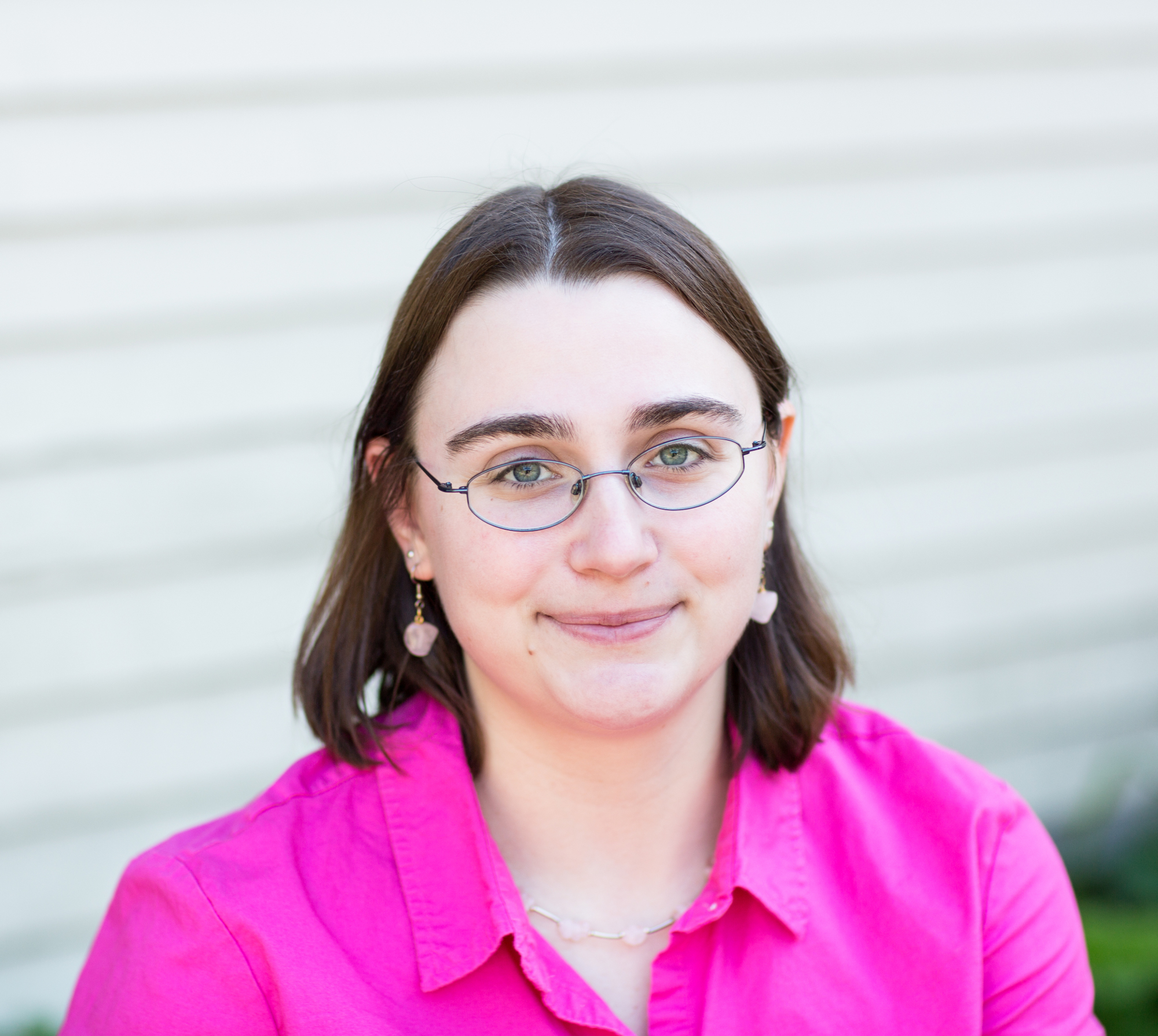
Our next keynote announcement for 2018 is Elizabeth K. Joseph!
Lyz is a Developer Advocate at Mesosphere where she
focuses on the Apache Mesos and DC/OS communities. Previously, she
spent four years as a systems engineer on the OpenStack Infrastructure
team and six years on the Ubuntu Community Council. She is the author
of Common OpenStack Deployments and The Official Ubuntu Book, 8th and
9th Editions. At home in the San Francisco bay area, she sits on the
Board of Directors for Partimus, a non-profit providing Linux-based
computers to learning facilities in need.
Two keynote announcements down, two to go. Keep an eye out tomorrow for our next 2018 keynoter reveal!



